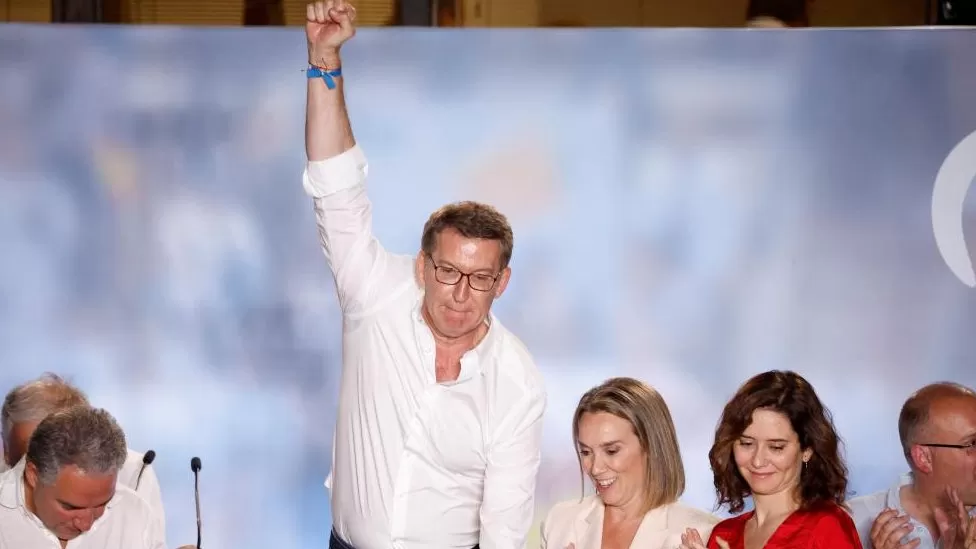Spain’s conservatives miss out on all-out victory

Spain’s conservatives miss out on all-out victory as left celebrates
Alberto Nez Feijóo, leader of the Spanish Conservative opposition, claimed victory in a snap election, but without the results he sought.
His Popular Party (PP) failed to win a majority in parliament even with the support of the far right.
As Socialist Prime Minister Pedro Sánchez declared: “The reactionary bloc has failed,” the rival Socialist camp cheered as loudly.
Both can claim success, but Spain’s outcome remains unclear.
On Monday, the parties will reconvene to discuss the results.
Borja Sémper, a PP official, said Mr Feijóo will first contact Mr Sánchez to ask him to support the Party in forming a “single government with specific agreements” – a request the Socialist prime minister is unlikely to accept.
What happens next?
King Felipe VI will invite Mr Feijóo to form a government as the leader of the party that won the most votes. The king may turn to Mr Sánchez if Mr Feijóo declines, as Mariano Rajoy did in a similar situation in 2015.
After accepting the king’s invitation, the candidate has two months to secure a majority.
In the absence of that, new elections must be held.
He told cheering conservative supporters that it was now his duty to form a government despite the inconclusive results.
Spanish voters know we have gone from being the second force to the party with the most votes,” he said, adding: “I hope this doesn’t start a period of uncertainty.”
That is what Spain is facing. Vox has 33 seats and Mr Feijóo’s PP has 136, so they are seven seats short of an absolute majority of 176.
As a result, Mr Sánchez’s Socialists and his far-left allies Sumar appeared happiest after the election.
The reactionary bloc of regression, which promised to reverse all the advances we’ve made over the past four years, has failed, he said.

El Espaol, a Spanish website, reported that Mr Sánchez still had a chance to form a government despite the PP’s victory.
In order to achieve those very slim chances, we would need to go even further than before by securing separatist support.
In addition, he would need the support of a hardline pro-independence party, Together for Catalonia (Junts). Jordi Turull, the party’s general secretary, said the result would be viewed as a “window of opportunity” for independence.
Far-right Vox leader Santiago Abascal was among the few leaders who didn’t celebrate the result. On Sunday night, he said, “This is a day of concern.”
The far right blamed the conservative PP for “complicity in the demonisation of Vox”, seeing Sunday’s result as the beginning of a “second round” before Christmas.
The objective of kicking Sanchez out has not been achieved… There will probably be another election where we can achieve this,” Abascal said.
During last week’s TV debate, the Socialist leader and Sumar showed unity, while Mr Feijóo, the conservative leader, was conspicuously absent, giving the impression that Vox was on its own.
In spite of this, Vox voters rallied in support of Mr Abascal’s anti-immigration and anti-feminism platform. He was seen by many as the best hope for defending Spain’s traditional values.
The turnout on Sunday topped 70%, as voters sensed the significance of this mid-summer election. Almost 2.5 million postal votes were cast, but polling stations were busiest in the morning before the heat set in.
The Vox party has three million supporters among Spain’s 37 million voters, but is not significantly ahead of Sumar and has lost a large number of seats.
